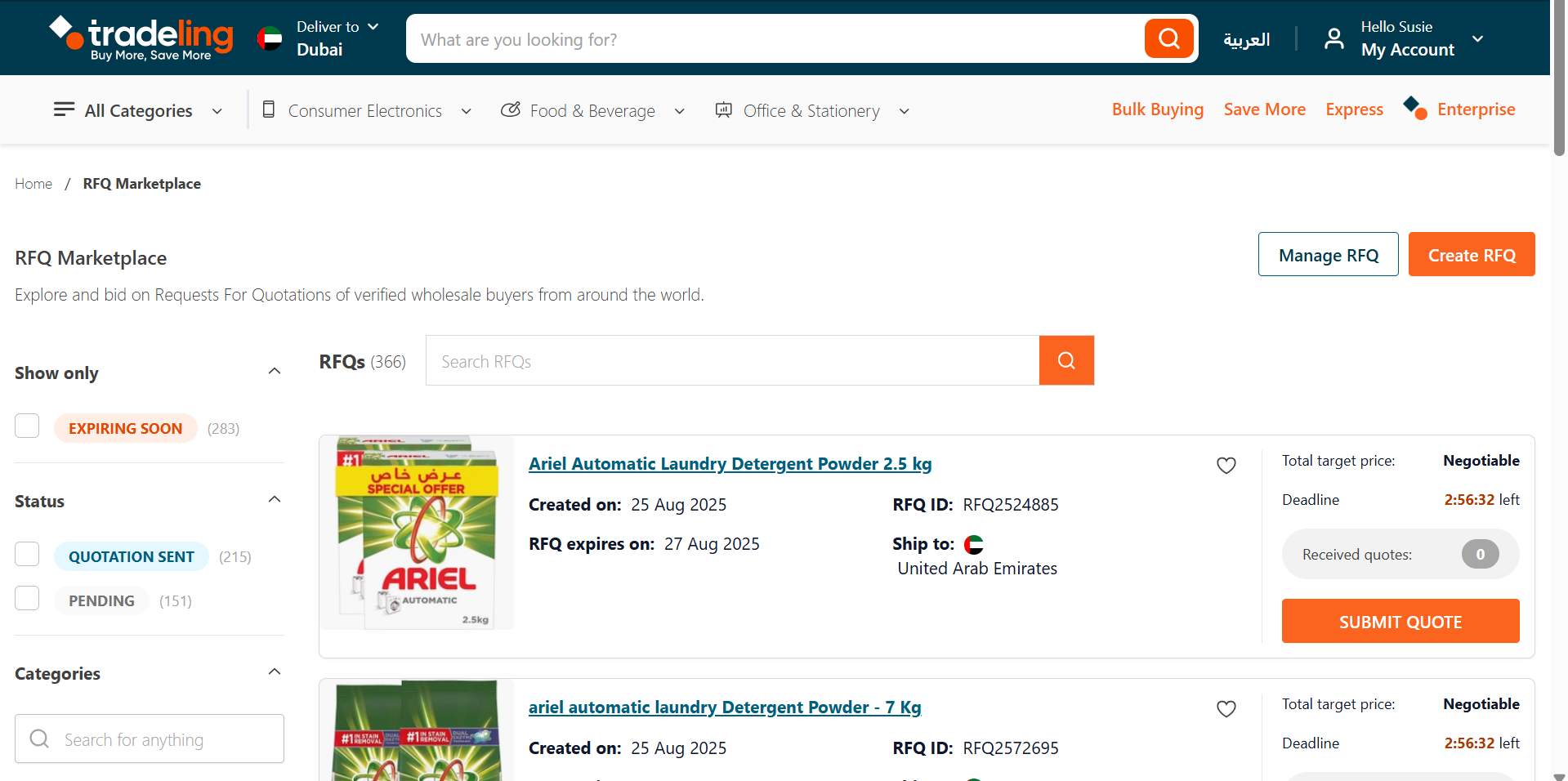
Strategic procurement requires clear cost assessments and supplier evaluations. A Request for Quotation (RFQ) provides businesses with structured price comparisons, ensuring purchasing decisions are based on precise data rather than assumptions. By standardising supplier responses, RFQs simplify cost analysis and improve sourcing efficiency.
If you want to learn more about what RFQs are in procurement, this article is for you. It outlines their function, steps, benefits, challenges, and the role of digital platforms in refining the process.
What Is An RFQ And How Does It Work?
An RFQ is a formal request sent to multiple suppliers, asking for price quotations on specific products or services. Unlike an open-ended Request for Proposal (RFP), which invites suppliers to propose solutions, an RFQ focuses strictly on cost, quantity, and delivery terms. This process is ideal when requirements are well-defined, allowing businesses to assess options based on competitive pricing rather than subjective value propositions.
By eliminating ambiguity, RFQs ensure that buyers receive standardised bids, making it easier to identify the most cost-effective solution while maintaining quality expectations.
The Difference Between RFQ And RFP
While both RFQs and RFPs facilitate supplier selection, their objectives differ:
- RFQ (Request for Quotation): Used when specifications are clear, requiring only price and delivery information from suppliers. RFQs are highly structured, focusing on numbers rather than strategies or proposed methodologies.
- RFP (Request for Proposal): Suitable for complex projects where buyers need detailed solutions, methodologies, and pricing models. RFPs allow suppliers to propose innovative approaches that go beyond just pricing.
For example, a manufacturer sourcing standardised raw materials would use an RFQ to ensure competitive pricing, while a company looking for a custom-built software solution would issue an RFP to evaluate service providers holistically. The key distinction lies in whether the buyer needs only pricing details or a more comprehensive solution tailored to specific challenges.
Key Steps In The RFQ Process
The RFQ process follows a structured approach to maintain efficiency and accuracy:
- Define Specifications – Clearly outline product details, quantities, delivery timelines, and payment terms. Specificity ensures that suppliers provide accurate and comparable quotations. On Tradeling, businesses can select existing products or list new ones when preparing RFQs.
- Select Suppliers – Identify qualified suppliers with proven capabilities and reliability. Tradeling connects businesses with a verified supplier network, making this step more efficient.
- Distribute the RFQ – Submit the request through Tradeling’s RFQ marketplace, which provides clear submission guidelines and facilitates supplier engagement. Setting an appropriate expiry date ensures that suppliers have adequate time to prepare accurate and competitive quotations while maintaining procurement efficiency.
- Receive and Evaluate Quotations – Compare pricing, terms, and supplier credibility based on predefined criteria. Tradeling provides an organised RFQ dashboard, allowing buyers to manage responses effectively.
- Award the Contract – Choose the supplier that meets cost and quality expectations before formalising the agreement. Tradeling enables a smooth transition from RFQ approval to finalising the purchase.
Each step reinforces transparency, ensuring procurement teams secure the best value while mitigating risks associated with unclear agreements. Having a structured RFQ process also allows businesses to document supplier performance for future reference.
Why Businesses Use RFQs In Procurement
RFQs provide several advantages that enhance procurement efficiency:
- Cost Optimisation – Competitive bidding results in better pricing, reducing procurement expenses. Multiple quotations ensure buyers are not overpaying for standard goods or services.
- Streamlined Decision-Making – Standardised responses make supplier evaluation faster and more objective. Since all suppliers respond to identical specifications, comparisons become more straightforward.
- Market Visibility – RFQs offer insights into market pricing trends and supplier capabilities. Understanding pricing benchmarks allows businesses to forecast costs more effectively.
- Supply Chain Transparency – A structured process prevents price discrepancies and ensures fair supplier selection. This reduces the likelihood of hidden fees or unexpected costs.
- Reduced Risk – Detailed requirements minimise errors and miscommunication in supplier contracts. Ensuring all terms are documented helps avoid potential disputes later on.
Common Challenges In RFQ Management
Despite their benefits, RFQs can present obstacles that impact procurement effectiveness:
- Unclear Specifications – Vague RFQs lead to inconsistent supplier responses, complicating evaluation. Buyers must ensure requirements are detailed and leave no room for interpretation.
- Limited Supplier Participation – If the process is too rigid, some suppliers may opt out, reducing competition. Offering reasonable timelines and clear instructions can encourage engagement.
- Comparison Difficulties – Variations in pricing structures or delivery terms can make direct comparisons challenging. Using digital tools to standardise responses can mitigate this issue.
- Focus on Cost Over Quality – Selecting the lowest price without assessing long-term reliability may create supply chain disruptions. Buyers must balance cost efficiency with supplier dependability.
Mitigating these challenges requires refining RFQ documentation, fostering supplier engagement, and incorporating technology to streamline evaluations. Careful planning ensures that RFQs remain an effective tool for procurement rather than a procedural burden.
How Digital Platforms Improve RFQs
Tradeling streamlines RFQ management by automating supplier interactions and quotation analysis within its digital marketplace. Through a single platform, businesses gain access to a broad and verified supplier network, ensuring efficient and competitive sourcing.
Key benefits of Tradeling’s RFQ system include:
- Faster Supplier Matching – A centralised supplier database connects buyers with relevant, vetted sellers, reducing sourcing delays.
- Automated Price Comparisons – Built-in tools simplify bid evaluation, reducing manual workload and standardising decision-making.
- Real-Time Communication – Tradeling enables direct messaging between buyers and suppliers, allowing for quicker clarifications and smoother negotiations.
- Data-Driven Insights – Access to historical pricing and supplier behaviour supports more informed procurement strategies.

By managing RFQs through Tradeling, businesses eliminate unnecessary back-and-forth, reduce administrative overheads, and gain a structured, transparent sourcing process. This automation not only minimises errors but accelerates decision-making across the supply chain.
Useful Tips for Buying And Selling Wholesale With RFQs
Optimising RFQ strategies benefits both buyers and suppliers in wholesale trade. A structured approach improves sourcing efficiency, reduces costs, and fosters stronger supplier relationships. Businesses that refine their RFQ processes gain a competitive edge by ensuring fair pricing and maintaining reliable supply chains. Understanding how to optimise procurement decisions can help both parties refine their strategies. The following wholesale tips provide practical ways to enhance sourcing and supplier negotiations.
- For Buyers:
- Provide comprehensive specifications to ensure accurate supplier responses. The more detailed the RFQ, the easier it is for suppliers to give accurate quotes.
- Shortlist suppliers based on reliability, not just pricing. Checking past performance and reviews helps avoid unreliable vendors.
- Establish clear timelines to maintain sourcing efficiency. Delays in procurement can disrupt business operations, so defining deadlines is crucial.
- For Suppliers:
- Submit competitive, well-documented quotations to increase selection chances. Including all relevant details ensures transparency and trust.
- Seek clarification on unclear RFQ details to avoid misalignment. Engaging with buyers before submission can help prevent costly misunderstandings.
- Maintain transparency in pricing and delivery commitments to build buyer trust. Hidden fees or unexpected delays can harm long-term relationships.
The Strategic Role of RFQs in Procurement
RFQs play a fundamental role in structured sourcing by providing cost transparency and ensuring reliable supplier selection. Businesses that use Tradeling’s RFQ marketplace gain a distinct advantage by accessing a reliable network, reducing inefficiencies, and improving procurement accuracy.
By defining precise requirements, engaging with trusted suppliers through Tradeling, and leveraging its integrated procurement tools, businesses can ensure that RFQs contribute to sustainable cost savings and long-term supply chain success. The right procurement strategy, supported by Tradeling’s technology, enhances sourcing efficiency and strengthens business resilience.
Contact us to learn how we can support your business goals.